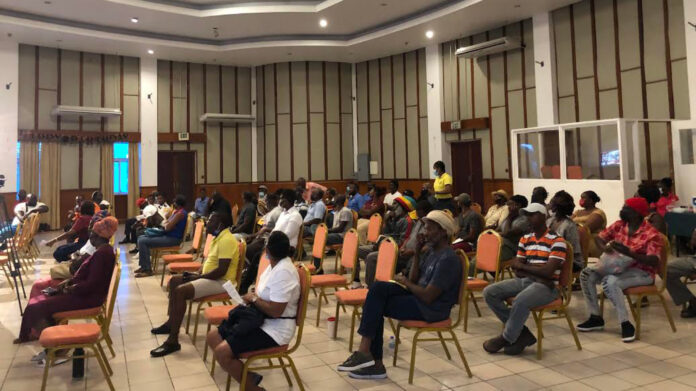
By Orville Williams
What started as an evening of scripted presentations shifted to a series of impassioned pleas from several of the farmers gathered last Thursday for a consultation with agriculture officials at the Multipurpose Center.
Agriculture Minister Samantha Marshall was joined by Permanent Secretary Colin O’Keiffe, Director of Agriculture Gregory Bailey, Chief Extension Officer Owolabi Elabanjo and representatives of both the Caribbean Agricultural Research & Development Institute (CARDI) and the Inter-American Institute for Cooperation on Agriculture (IICA), in addressing the nearly 50 farmers who attended, representing districts across the country.
Paul Lucas and Craig Thomas, of CARDI and IICA respectively, got things underway with an update on the work their respective organisations are doing to support the sector in Antigua and Barbuda – from drought-resistant grass for live stock farmers to irrigation technologies for crop farmers.
Thomas in particular stressed the importance of accessing grant funding, noting that there are many international entities offering ‘free money’ to assist small farmers, money that often bypasses farmers in Antigua.
He urged the farmers to reach out for assistance in putting together proposals to access this funding, especially now that inflation is placing a heavy burden on the sector.
The Agriculture Ministry officials similarly spoke on their work to support the farmers, while acknowledging the many challenges – including the lack of consistent water access, the prevalence of praedial larceny and the difficulties in acquiring land – that the sector is facing.
Among other suggestions, they encouraged the farmers to establish small associations to better lobby for district-specific support and to be more innovative in their production methods, while assuring them that the ministry remains “steadfast” in its intention to providing the necessary backing.
That assurance was considered ironic by many of the farmers who took centerstage after the initial presentations to voice their concerns, as they complained of facing the same struggles for decades without any noteworthy interventions from the ministry.
Take praedial larceny for example. One farmer explained that, based on word from a police officer, someone trespassing on his property with the obvious intention to steal would not face any serious repercussions unless they were caught with the stolen produce.
The farmer then questioned whether he would have to “sit and watch” the thief leaving his farm with the stolen goods, before calling the police. By that time, he quipped, the thief would be long gone.
Another farmer – on the same topic – hypothesized that if he were to purchase a goat for $10,000 and it is stolen and sold for significantly less, the only punishment that would be laid on the thief is prison time.
Arguing that the laws don’t cater enough to redress for the farmers, he too quipped that, ‘all that would happen is a man would be in jail and I would be out of $10,000’.
“Where is the Agriculture Ministry?”, both men asked, “to call for legislative changes that will deter persons from committing praedial larceny and give better protection to farmers?”
Another major concern voiced by the farmers – and by the entire country it seems over the past couple of months – was the inconsistent supply of water, made worse by the prolonged drought conditions.
The Agriculture Minister attempted to allay that concern, speaking on the many improvements posited by the government to permanently address the water situation, but she was challenged by the farmers, one of whom lamented the fact that no solution to the longstanding water situation has been found in decades.
The Minister did make one bold promise to the farmers though, on the topic of competition in the consumer market and the challenge posed by imported products.
The farmers lamented the shift in the operations of the Central Marketing Corporation (CMC), from its initial purpose of supporting the farmers to now serving as a retail hub and in many ways a ‘competitor’ to the farming community.
Marshall acknowledged that shift and pledged to reform the CMC, so it could once again, serve its initial purpose. She also noted the continued efforts to reduce the nation’s dependence on imported food, adding that the Agricultural Development Corporation (ADC) is also in line for some attention.
The farmers also spoke on other issues such as the impact of the wild tamarind plant, which was introduced into the country in the 1970s as a means of feeding livestock, but evolved into an invasive plant which was costly to get rid of.
The ease of acquiring land was also raised, with the farmers protesting the costly and lengthy process of getting lands assessed and allocated. The Ministry reminded that changes were made to make the surveying process cost-free for the farmers, and promised to bring greater clarity on these situations in the near future.
Along with these and several other issues, the largely small farmers who were present bemoaned the ‘rough’ treatment and the neglect they feel they have been receiving from the Ministry, questioning why the large-scale farmers were absent from the consultation.
“Dem nuh need Ministry help, dem have dem money. And that is why we are the ones facing these struggles, because we don’t have the kinds of resources [the large-scale farmers] have and we have to depend on help”, one farmer told Observer.
She also revealed that, like many of the farmers who attended the consultation, farming has been a multi-generational business for her family. Without the proper support, she added, it could very well end with her.
